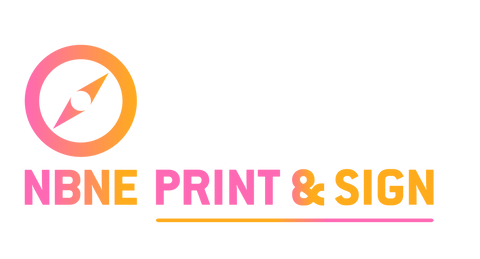Working on, rather than in, your business
Share
Why working ON the business is so important!
When you run a small business—especially one like ours where every product is made in-house, and the day-to-day is a mix of customer queries, production deadlines, and trying to keep our online sales channels up to date - it's easy to get trapped in the grind. We’ve been there (and if we’re honest, we’re still there more often than we’d like to admit).
Toby and I run a signage manufacturing business in Alnwick. We started with a simple idea: make quality signs that people actually want. Over time, that turned into producing thousands of items, ranging from generic signs sold on Amazon to highly personalised memorials printed in-house. We've now moved into larger signage too for local businesses which has brought more challenges. The economic climate means it's a constant struggle to keep up and some days, it feels like we’re just running to stand still.
Did you know that most small business owners spend all their time working in the business—doing the hands-on, technical work—but almost none of their time working on the business—planning, improving systems, and thinking strategically. We’re living proof of this.
There are always orders to pack, listings to update, machines to maintain, new products to launch, and always a backlog of custom work. We get footfall from locals wanting “just a quick job”—and that can into a distraction that can lose us money.
We know that if we want to grow—really grow—we need to step back and behave more like entrepreneurs and managers, not just technicians. But that’s so much easier said than done.
When you're stuck in the daily churn, you might be busy but not necessarily productive. You might be working 10 hours a day, but still watching the bank balance go down. That’s because without systems, strategy, and planning, a business can easily become a job you own rather than a machine that works for you.
Here’s why carving out time to work on the business matters:
-
Clarity: You stop reacting and start directing. You set goals, identify your most profitable products, and make a plan.
-
Profitability: You can focus on the products and channels that actually generate revenue instead of chasing every job.
-
Sustainability: You reduce burnout. No one can sprint forever. Without systems, everything relies on us. That’s a fragile business.
-
Growth: You create the foundations that allow others to step in. That might be staff, automation, or outsourcing.
When cash is tight and the workload is high, finding that time is really hard. We struggle with this every week. Sometimes, just keeping the orders flowing and the lights on feels like a win.
That’s why we’re starting small - trying to set aside just one hour a day to work on the business. That might mean reviewing our product range, building a new pricing tool, automating a restock report, or just thinking about how to say “no” to the kind of jobs that drain us.
It’s not perfect. We still fall back into old patterns. But even a little time spent stepping back is better than none at all.
We’re sharing this not because we’ve got it all figured out—we haven’t. We’re still in the thick of it. But we want to be open about how tough it is to juggle it all, and why we’re trying to do better.
Our long-term goal is to build a business that doesn’t rely on us doing everything ourselves. One with systems, a team, and a future we can actually enjoy. But to get there, we need to fight for that hour a day. We need to protect it like it’s the most important job we’ve got—because it is.
If you're in the same boat, we see you. And if you ever want to share ideas or frustrations, our door (and inbox) is always open.
Jo, Toby and the NBNE Team
